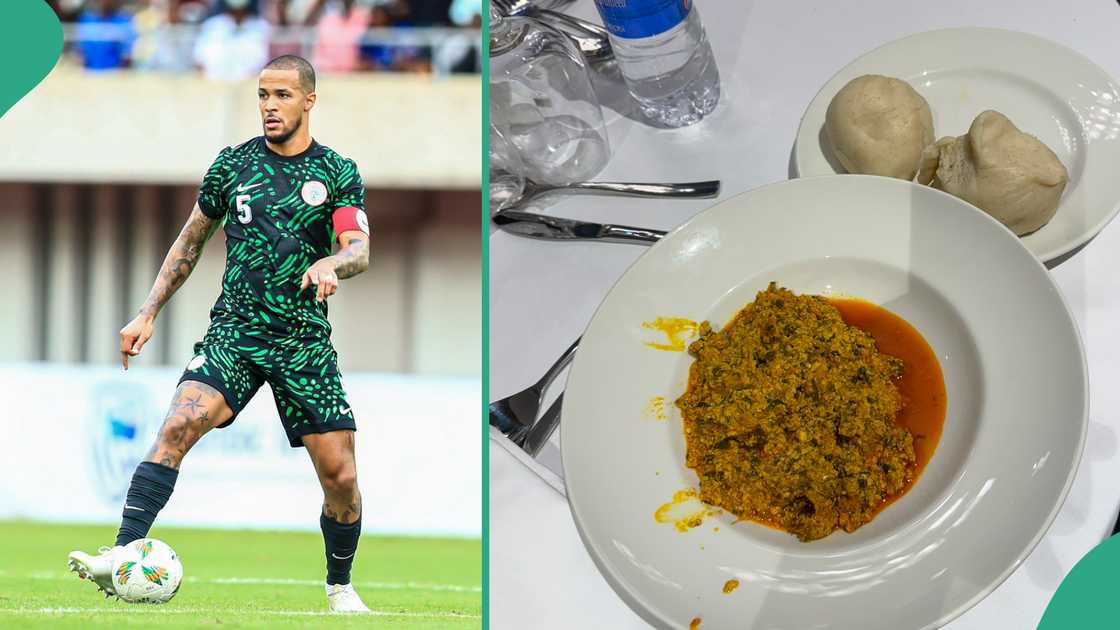William Paul Troost-Ekong, the captain of Nigeria's Super Eagles team, has recently caught the attention of fans and food enthusiasts alike after showcasing a rather unconventional meal. The 31-year-old professional footballer shared a picture of his dish, which comprised fufu accompanied by what appeared to be egusi soup, but notably lacking any meat. This revelation has led to various reactions and discussions among fans, prompting questions about dietary choices, especially for those in the sporting world.
As a professional athlete, Troost-Ekong's eating habits are often scrutinized, given their potential impact on performance and fitness. The absence of meat in his meal raised eyebrows, particularly in a culture where meat is considered an essential part of a hearty dish. This curiosity led to insights from fans and observers, including a Nigerian man living abroad who speculated on the reasons behind this dietary choice.
In this article, we explore the reactions surrounding Troost-Ekong’s meal, the cultural significance of meat in Nigerian cuisine, and the broader implications of dietary choices for athletes. Join us as we dive into the conversations that have emerged, shedding light on the intersection of food, culture, and sports.
Table of Contents
- Biography of William Paul Troost-Ekong
- Reactions to Troost-Ekong's Meal
- Cultural Significance of Meat in Nigerian Cuisine
- Dietary Choices of Athletes
- Final Thoughts
Biography of William Paul Troost-Ekong
| Detail | Information |
|---|---|
| Name | William Paul Troost-Ekong |
| Birth Date | September 1, 1993 |
| Nationality | Nigerian |
| Position | Defender |
| Current Club | Al-Kholood |
| International Career | Captain of Nigeria's Super Eagles |
Reactions to Troost-Ekong's Meal
The image of Troost-Ekong’s meal sparked a variety of reactions from fans on social media. Many expressed surprise at the absence of meat, a staple in many Nigerian dishes, leading to speculation about his dietary choices. Comments ranged from humorous takes about the possible presence of meat hidden in the soup to serious discussions about the implications of an athlete’s diet.
One user pointed out that not having meat might be a reflection of Troost-Ekong’s personal diet, possibly indicating he is following a fitness regimen. Another humorously suggested that he might have eaten the meat before taking the picture! Such light-hearted banter showcases the community's engagement with the player’s lifestyle choices.
Cultural Significance of Meat in Nigerian Cuisine
In Nigeria, meat often symbolizes wealth and abundance, making its absence in a meal noteworthy. Traditional dishes are usually rich in proteins, and meals without meat can sometimes be viewed through a critical lens, as some might think it reflects economic status or dietary limitations.
For many Nigerians, meals are a communal experience, and sharing plates filled with meat is a common practice during gatherings. The cultural implications of Troost-Ekong’s meal reveal deeper insights into societal expectations and norms surrounding food, particularly in the context of Nigerian culture.
Dietary Choices of Athletes
Athletes like Troost-Ekong often have specific dietary requirements to maintain peak performance levels. The absence of meat could suggest he is on a strict diet aimed at enhancing physical fitness or recovery. Many athletes adopt varied eating plans, sometimes leaning towards vegetarian or vegan diets for health reasons or personal beliefs.
Understanding these dietary choices helps fans appreciate the dedication athletes have towards their health and fitness. Such choices are not merely personal preferences; they can play a significant role in an athlete's overall performance and career longevity.
Final Thoughts
The discussion surrounding William Paul Troost-Ekong’s meal is a fascinating intersection of culture, personal choices, and the life of an athlete. It demonstrates how something as simple as a meal can lead to broader conversations about dietary practices and cultural significance in Nigeria.
As fans and observers, it's essential to respect the personal choices athletes make regarding their diets and understand the reasons behind them. Whether it’s for fitness, health, or personal beliefs, these decisions often reflect a deeper commitment to their craft.
Engaging with such topics not only enriches our understanding of our favorite athletes but also highlights the intricate relationship between food, culture, and identity.

Source: Twitter
Nigerian Superstar Davido Wows Fans With Stunning Diamond Necklaces
A Man's Warning To Wizkid: The Drama With Davido Heats Up!
The Remarkable Legacy Of Michael Taiwo Akinkunmi: Designer Of Nigeria's Flag


